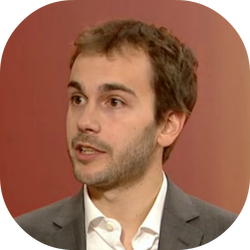Roberto RoccuTopics of Interest:
Critical Political Economy; IPE of the Middle East and North Africa; Historical Sociology; PE of Reforms and Revolutions; PE of Neoliberalism; PE of Late Development; European Neighbourhood Policy (ENP); Southern Europe; Mediterranean; Qualitative Methods in Critical Political Economy Countries/Regions of Interest: All Middle East and North Africa (especially Egypt), European Union, Southern Europe |
|
List of Publications Books: (2013), The Political Economy of the Egyptian Revolution: Mubarak, Economic Reforms and Failed Hegemony, Basingstoke: Palgrave Macmillan, 150 pages. Book Chapters: (forthcoming, 2016), ‘Neoliberalism as Passive Revolution? Insights from the Egyptian Experience’, in Francesca Antonini, Aaron Bernstein, Lorenzo Fusaro and Robert Jackson, eds., Past and Present: New Insights into Gramsci’s philosophical, historical, and political thought, Leiden, E.J. Brill. (2016), ‘Inequality and Poverty in the Neoliberal Era’, in Alan Cafruny, Gonzalo Pozo and Leila Simona Talani, eds., The Palgrave Handbook of Critical International Political Economy, Basingstoke: Palgrave Macmillan, pp. 181-207. (2015), ‘Neoliberal Restructuring, Forced Migration and Unprotected Work in a Globalising Cairo: A Critical International Political Economy Perspective’, in Leila Simona Talani and Simon McMahon, eds., Handbook of International Political Economy of Migration, Cheltenham: Edward Elgar, pp. 349-372. (2013), ‘A Problem You Just Could Not Live Without: Globalization, Neoliberal Islamism and Informal Sector in Cairo’s Dual Economy’, in Leila Simona Talani et al. (eds.), Shadow Economies: Towards a Political Economy of the Underground in Global Cities, Basingstoke: Palgrave Macmillan, pp. 135-160. (2012), ‘Of Middle Classes, Economic Reforms and Political Revolts in the Middle East: Why Democratisation Theory Failed, Again’, in Stefania Panebianco, ed., Winds of Democratic Change in the Mediterranean? Actors, Processes and Possible Outcomes, Palermo: Rubbettino, pp. 61-82. Peer-Reviewed Articles: (forthcoming, 2017), ‘Passive Revolution Revisited: From the Prison Notebooks to Our “Great and Terrible World”’, Capital & Class. (2013), ‘David Harvey in Tahrir Square: Dispossessed, Discontented and the Arab Spring’, Third World Quarterly, 34(3): pp. 423-440. Working Papers: (2015), ‘Egypt’s Asymmetric Integration in the EU: The Making (and Unmaking) of a Neoliberal Borderland?’, EUI Working Paper RSCAS 2015/32, Robert Schuman Centre for Advanced Studies, European University Institute. |
Since completing a PhD in International Relations at the London School of Economics in 2012, Roberto Roccu has joined King’s College London, where he works as a Lecturer in International Political Economy. He also serves as coordinator of the IPE@King’s working group, which brings together staff and students from several departments at King’s College working in the field of international political economy broadly conceived. Before moving to the UK, Roberto completed a BA in Political Science at the University of Sassari in his native Sardinia and an MA in International Studies at the University of Bologna-Forlì. His work sits at the intersection between international political economy and historical sociology, with specific reference to the Middle East, as most of his research focuses on the social and political reverberations (democratisation, Arab uprisings, crisis of party systems in Southern Europe) of global economic transformations (globalisation of production and finance, neoliberal economic restructuring, global financial crisis and austerity). Roberto is the author of The Political Economy of the Egyptian Revolution: Mubarak, Economic Reforms and Failed Hegemony (Palgrave Macmillan, 2013). |


